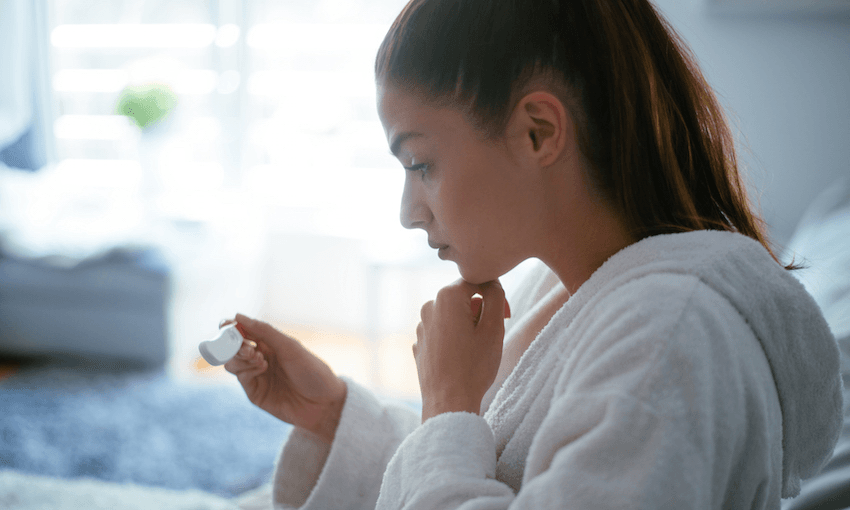Our current understanding of infertility is limited and leads to unfair stigma, Hannah Gibson writes.
Ask most people what they think infertility is, then they will most likely answer ‘it is when you can’t have children.’ It is nearly always contexualised contrary to the idea of ‘fertility’, sitting in opposing categories and corners from one another. I used to think this way too.
When I was 17, I woke up from an anaesthetic after a laparoscopy – to find my gynaecologist standing to the left of me. As I peered drowsily at him from my hospital bed, he got a paper hand towel, coarsely drew a female reproductive system, circled one ovary and crossed out all the rest. I looked at it and then again at him, when he said quietly, “we did the surgery and found that you have nothing.” So solemn.
The next few seconds of silence hung in the air, the dramatic bow to his punchline. But he continued, filling the air with words that stung because they marked me as different, as a strange specimen. “We didn’t find a tumour, but we did see you have no uterus. Nothing.” I was sent home with the knowledge that I had MRKH, a condition where my reproductive system (along with other things) failed to develop in the womb. A complete case of infertility as it was diagnosed – and I had to pick up the thousand pieces of my identity that had crumbled, to grieve what I would never have.
It was not until later in my 20s that a gynecologist stopped me mid-sentence, chastising me for using the word ‘infertile’. “You’re not infertile. You have a working ovary. You are fertile.” It stopped me in my tracks.
Never had I looked upon my situation in this way. Her words were one of the reasons that I ended up starting my PhD in reproductive anthropology three years ago. I am fascinated by how we think about fertility and in turn infertility. I wanted to explore ‘wombs’ because so many people were concerned with my lack of one. I have learnt that my body challenges the dominant cultural understanding of what a woman is expected to have and be.
I research surrogacy and how it is practiced in Aotearoa. I have met so many people who, like me, further challenge the fertility/infertility binary. There are so many nuances to ‘fertility’. Cis-gendered (non-transgendered) men are considered socially infertile because they cannot, with another cis gendered male, ‘naturally’ (meaning without the use of assistance in this context) produce a child. A woman who undergoes a hysterectomy due to cancer may still have viable eggs but is considered medically infertile because she would not be able to conceive ‘naturally’. I am medically infertile because I do not have a womb. Someone may have a womb that may gestate a baby successfully but has no viable eggs.
Why do I even think about this? Because infertility is stigmatised and people are rarely comfortable talking about it outside of their homes. I want to ever so gently (or perhaps forcefully) flip the script and highlight that the spectrum of differing levels of fertility does exist and things are not black and white.
For many, the value of fertility is not equal. Think of those communities where often members of the public are quick to judge based on their own ideas of what a family looks like. In relation to Māori, people have told me that they are ‘too fertile’, which places a value on their rights to have a family. This is not just an isolated opinion that has no impact, because it seeps into funding criteria that has a racial bias against Māori and Pasifika.
The disabled community are often considered to be incapable of giving children a quality of life that they deserve. As a disabled woman, I have been told at different points that perhaps not having a womb is a blessing, because it would be hard for me to be a good mother as I am.
For the LBGT, as Sharyn Graham Davies pointed out in her recent piece for The Spinoff, they are often publicly seen as less worthy to having children than heterosexual couples.
Am I infertile? I cannot deny the fact I would require someone to gestate a baby for me if I wanted a genetically related child. Yet, at the same time I am also fertile. I have had to somehow hold these two realities side by side and find peace with both. It is neither one or the other, even though it does feel like I will not ever have genetically related children for many reasons. At the same time, I have found it important to embrace the one ovary that hangs out in my lower abdomen. To love what is fertile about my body and what is not. Which brings me to my last point.
I want to very firmly tell anyone who reads this and thinks that those who require assistance to create a family should ‘just adopt’ or ‘accept it because there are enough people in the world as it is’ – Adoption is an option for very few people. Yes, they can foster but not everyone is comfortable to do that, and that’s okay. Infertile individuals or couples are not solely responsible for doing something about the world’s growing population and they should not be made to feel that way. There is no way that saying this to someone is okay, and I suggest that if one does have the urge to let a judgement slip out, they look at their own contribution and responsibility first.
